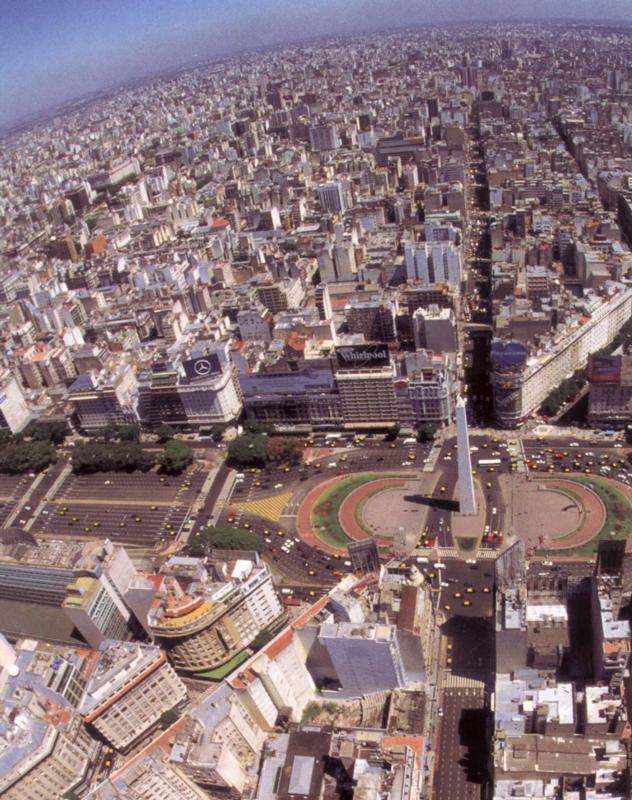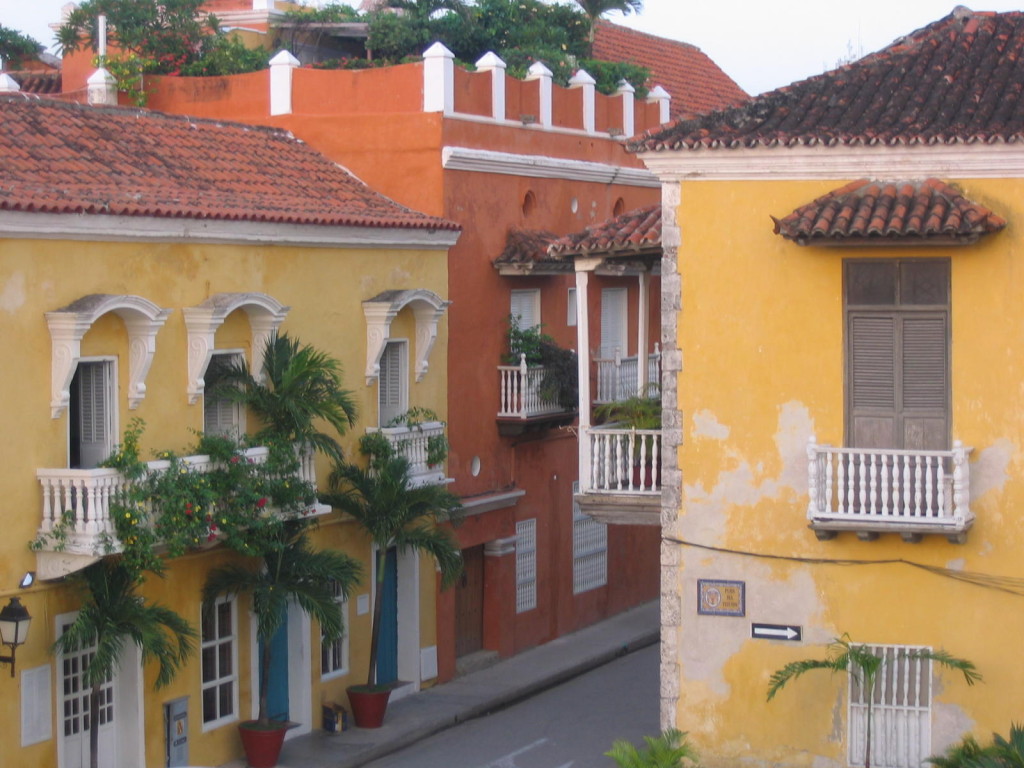A few days ago, The New York Times published its list of the “31 Places to Go in 2010.” My former adopted country, Colombia, clocked in at number 26. Certainly, the country is worthy of inclusion on this list; the cultural and geographic diversity alone make it a stimulating visit, and it’s not any more dangerous than much of the US. But it was the last line of this almost-four-paragraph blurb that had the needle scratching the LP in my head: “It has even prompted some travel bloggers to call Cartagena the next Buenos Aires.”
Now, first of all, I’m always annoyed when people dub something “the next” anything, as if there’s a problem with the original something and it needs to be replaced. In fact, for me, that phrase serves as a warning: stay away from Panama because it’s becoming “the next Costa Rica” (read: overrun by drunken Spring Breakers and monolingual retirees).
Granted, travel writers and people in general tend to compare places with others, and that’s OK, especially if the comparison is couched in the writer’s own experience or relegated to certain aspects of a place, such as its nightlife or cultural impact. But as much as I’ve compared São Paulo and New York, I would never call São Paulo “the next New York.” New York, for one, ain’t goin nowhere and São Paulo’s too busy being the next São Paulo to be anything else. There’s also the danger of glaring generalizations and a glossing-over of history, which, as modern and supposedly culturally-sensitive writers, we’re supposed to be avoiding as much as possible. So comparing a tropical colonial port and resort town with a national capital in a temperate climate with a ludicrously different set of demographics and a population 13 times as large is comparing apples to airplanes: they both start with “A.”
I Googled the offending phrase to identify these mysterious “some travel bloggers” that the Times references. “Some travel bloggers” turned out to be one travel writer named Liz Ozaist, featured in Budget Travel magazine back in 2008 with an article titled “From Cartagena, With Love.” The subheading (or super-heading, really, since it appears above the title): “The Next Buenos Aires.” Now, in fairness to Ms. Ozaist, she probably had nothing to do with the addition of that, to my mind, inappropriate heading. She most likely submitted the article to her editor with the title, which alludes to her father’s love for the place ingrained a couple decades before her trip, and hit the road for her next story. I would think it’s the editors at Budget Travel (Lawd, they prolly never gon publish me now) who got it wrong. And though I was drawn in to the article because of Ms. Ozaist’s attention to detail and the interesting characters she meets, I got thrown every time someone compared Cartagena to a place that I feel bares absolutely no resemblence whatsoever. “‘Cartagena reminds me of Venice,’ [Todd] says, ‘it has that same intangible magic about it.'” That’s how Cartagena makes Todd feel, and it’s certainly valid, but I will say this: Cartagena’s surrounded by water, but ain’t nary a gondola floating around in what I would hesitate to consider canals.

Now, I must admit that I’ve never been to Buenos Aires myself. However, as a student of Latin American history and culture and as a traveler who has spoken to many people about Buenos Aires, I have a pretty decent idea of the kind of city that it is: fairly affluent (for Latin America), boldly planned with broad boulevards and Parisian-inspired architectural flourishes, sidewalk café culture, and peopled largely by the descendents of many European immigrants.
On the other hand, for most of my time in Colombia, I lived less than a 2-hour drive away from Cartagena and spent many weekends rambling the streets of the “walled city.” I called up a good friend who had also lived there, married a Colombian girl, and honeymooned in Buenos Aires:
Ring, ring.
“Hello?”
“What’s up, T? It’s Fly Brother. Lemme ask you something. How would you compare Cartagena and Buenos Aires?”
“What do you mean?”
“The two cities, how would you compare Buenos Aires and Cartagena?”
“In what way?”
“Just, like, in general. Like comparing DC and New York, how would you compare Cartagena and Buenos Aires?”
“You can’t compare them. They’re not comparable.”
“Well, they’re both Spanish-speaking cities in South America.”
“That’s about it.”
“I thought so. Thanks, and Happy New Year.”
Click.

Cartagena’s a small, provincial capital supported by tourism and secondary port facilities. The streets of the old quarter are narrow and, like most Spanish colonial cities, disorderly. Most of the people are descendents of the African slaves that passed through the city’s gates as the principal slave port on the Spanish Main. It’s a place for a slow, sunny Sunday afternoon in a hammock, listening to some Cuban son, knocking back the aguardiente; a beach town with fruit sellers and hair braiders and high-rise condos to prove it.
While Ms. Ozaist makes one reference to Cartagena reminding her of one particular neighborhood in the Argentine capital, she alludes to Havana, Cuba’s capital and Cartagena’s closest relative, at least three times in her article; that is the city most evoked while strolling along cobblestone streets under grand arches and pastel facades, something I can speak to personally, having been there thrice. The unmistakable African influence, from the cooking to the music to the lilt of costeño Spanish, that sets Cartagena in the gilded frame of other New World treasures such as New Orleans, Santo Domingo, and Salvador da Bahia, is the single most noticeable feature that separates it from Buenos Aires (also a former slave port, but most folk don’t even know that).
In 2007, the Times published this article, offering up a true serving of Cartagena’s richly tragic past and present. The author, Tim Parsa, seems to have researched the history and culture of the place before penning the piece, an effort that appears to be lacking in this week’s Times blurb by Denny Lee (Did you just Google Cartagena, dude?).
I’m not saying any of this to poo-poo The New York Times or Budget Travel or any particular travel writer or editor or whathaveyou. All I’m saying is that folks, travelers in particular, need to research multiple sources beforehand, then visit a place for themselves in order to get a real sense of their destination. Clearly, relying on media (including Fly Brother) can mean getting erroneous descriptions and untenable comparisons in a subjective attempt to make a place seem more or less appealing than it is.


Fantastic post!FYI, Liz is actually (was actually) a senior editor at BT at that time.
i was so happy that there are so few places where i would actually go on that list — that i haven't already been to before. this list they gave means that i only have to worry about german tourists [because they are EVERYWHERE] and peace corps workers on leave. and that's exactly how i like it. it annoys me to run into americans on holiday, especially in africa. so. loud. and. annoying. it makes me want to hide behind the obligatory vendor and start arguing politics in either pidgin french or pidgin english until said tourists go away. [i actually learned that trick from a peace corps guy.]germans have serious travel fu — but absolutely zero "how not to get robbed" sense. "i'm chermin, wir sind nice people. this man with the gun is trying to protect me." yeah, okay, buddy. the travel list that you really need to worry about is the ones offered in the german press. *then* a place is ruined.
Hey… I just deleted my facebook because i was pissed with something. Doesn't matter anymore, i'll be back there soon. But the matter is that you're coming to Brazil. Nice!Brasilia, right? So, take my number: 11-70933232. When you get here, give me a call. Anyway, i'm doing very well, still jobless, but hopefully to get one soon. These times in Brazil sucks…And carnaval is coming. We all have to wait to start the year after that… Really sucks, hehePS: Your blog is very funny. love it!
Nice work Fly Brother in getting ppl to understand that a common language doesn't mean the same culture. I would say I expect better from the times, but I don't.Can't stand the "next this" either. Why can't a place be respected for what it is? Out of the whole list, Bahia & Marrakesh are places I want to visit.
So Cartagena is more like Salvador than Buenos Aires….interesting…I am living in Salvador now and trying to think about other S. American cities to visit. I read that article and was considering Cartagena, but maybe I will pick something a little different.
Geotraveler: Eep! Guess I was too free with the benefit of the doubt. Thank you very much for the compliment! :-)Kwere: I don't know, dude…I've found the Germans I've come across in my travels to be quite worldly. But I'm like you around obnoxious Americans; I try and blend in like a roach caught with the light on.Violence: Numero anotado. Te ligo quando chege ao Brasil. Lastima que nao tem trabalho, cara, e que todo fecha pelo carnaval.SDG: Welcome to Fly Brother and thanks for commenting! In total agreement with you. Bahia is phenomenal (and I hear the same thing about Marrakech). I'd recommend trying to go when most folk are typically working (Sept-early Dec, Feb-late May).Mae: Welcome as well. If you live in Salvador, you will be totally underwhelmed by Cartagena. They're pretty similar, but the vendors in Cartagena are much more aggressive than in SSA and the beach isn't as nice. That said, I would suggest Bogota, Medellin, and Cali. They're all interesting cities with a culture very distinct from Brazil (though Cali's definitely got a nice Caribbean flavor). Come to Colombia, but I'd definitely skip CTG if I were already living in SSA. And no, Cartagena and Buenos Aires are nothing alike.
Fly Brother,
I think you completely missed the point of the phrase “The next Buenos Aires”.
The phrase is not trying to say that Cartagena looks and feels like Buenos Aires.
Rather the phrase is sort of like the phrase “Gay is the new black”….which is implying that being gay has become so trendy
nowadays that it like the color black (the color black is trendy because it goes with everything).
Also, no person in their right mind would ever compare the two cities in the physical and ambience sense (I’ve been to both Cartagena and Buenos Aires).
I think what the statement is trying to say is that Cartagena is like Buenos Aires in the sense that it is the next hot / trendy
travel destination in South America.
So in summary, Buenos Aires has been a trendy travel destination in South America for some time now in the press and with travelers.
Now, a lot of foreign travelers and the press are finding out about Cartagena and so the city has started to become a new trendy destination.
Hence in this sense, the phrase “The next Buenos Aires” does fit.
For some reason they chose “Buenos Aires” as the comparison, but really you could have picked any trendy word and made a similar statement.
So for example, “Cartagena is the new Gay”……or “Cartagena is the new Black”.
Ok, I’m exagerating, but you get the point.